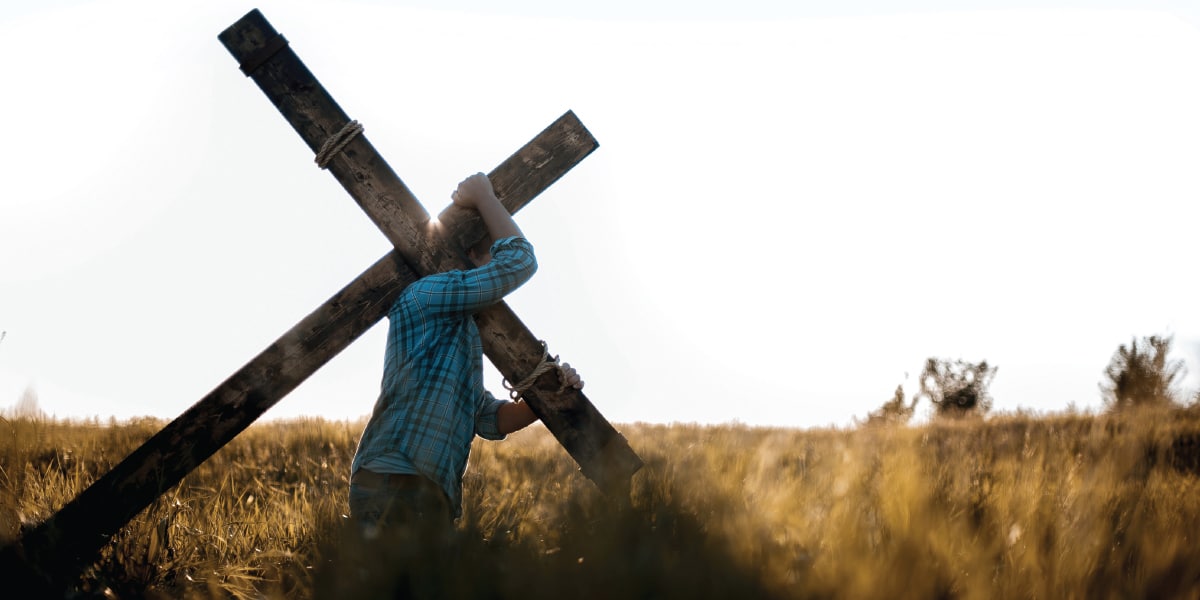It was Fall 2020. The cool air was crisp in the early morning. I was pulling into my parents’ driveway for my scheduled day to help care for my dad, who was dying.
“Help me to be a good Simon today, Jesus,” I whispered as I put the car into park and went in to face whatever my dad needed for the day. I do not know what inspired me to start praying that short prayer, but it quickly became a tradition on the days I cared for Dad.
Before my dad’s death in January 2021, my three siblings and I took turns during the week caring for my dad while my mom continued to work as a hospice nurse. Those six months I learned more about what it means to suffer and die a holy death than anything I ever learned in seminary graduate school or read in a book. I learned by doing, by being with, by showing up to what was difficult and what was being asked of me in the moment.
I learned how to be a Simon to my dad, who was preparing for the end of his earthly life and the beginning of his eternal life.
If we look at the New Testament, very little is said or known about this man who helped Jesus carry his cross for a brief time. We don’t know how long he trudged through the streets with Jesus or if Simon and Jesus shared words with each other. He perhaps is one of the least known characters in the passion of Jesus. The three Gospel accounts (Matthew, Mark, and Luke) that speak of Simon state he was from Cyrene, a prosperous city near the northernmost part of modern-day Libya. There had been a Jewish population there since the Diaspora.
Walking with Those Who Suffer
What was going through Simon’s mind as he helped Jesus carry the cross? What happened when he arrived at Golgotha? Did he stay and watch? Did he disappear back into the crowd, not wanting to look upon the horror any longer? Did he hear the hammer blows, the groans, the agonizing screams of Jesus? Was Simon changed from the experience of helping Jesus carry the cross?
I think we could agree that there is still such suffering in the world—on local, global, and personal levels. The suffering of migrants and refugees fleeing political violence and danger. The devastation of Gaza. A growing authoritarian style of government in our country. Continual gun violence ravaging our children and their schools. The war in Ukraine. Seniors who do not have money for both food and their necessary medicines. White Christian nationalism at an all-time high in our country.
Your sibling’s divorce, difficult family relationships, a heavy health diagnosis, mental health issues, a traumatic death of a child, inability to get pregnant—suffering will touch every single one of our lives at some point.
Perhaps the example of Simon of Cyrene is a model for us when we walk with people through suffering and hardship. He shows how not to avoid it but submit fully to walking with, being with—even when it costs you something.
There are people suffering all around us each day, and many of them will not reach out for help or support. Can we look for them? Can we be attentive to those around us who need a loving, supportive Simon to help them shoulder their suffering and burdens?
One of the most painful things when navigating hardship and heaviness is the feeling that you are doing it alone, that you have no one to support or love you through the worst parts. I imagine Jesus felt that in moments during his passion. When people hurled rocks and spit upon him. When the religious leaders and gathered crowds jeered at him. When his closest friends ran away in fear, completely abandoning him.
Sometimes the greatest lessons we can learn from various women and men in the Scriptures are from those who spoke the least or, at least in Simon’s case, who appear to have no recorded words.
Simon is a reminder for us to show up and be with those who need help carrying the load of suffering in their lives.
Prayer
Jesus, my friend, you had so few people show up and help you as you walked toward your death.
Simon showed up when you were most tired and exhausted. He walked with you, supported and encouraged you.
May his example inspire me to walk with those around me who are in pain or suffering.
Help me not turn my eyes from the plight of my loved ones and my community. Amen.



1 thought on “Help Me to Be Simon ”
What does “white Christian nationalism” mean??